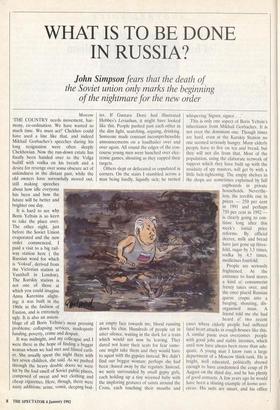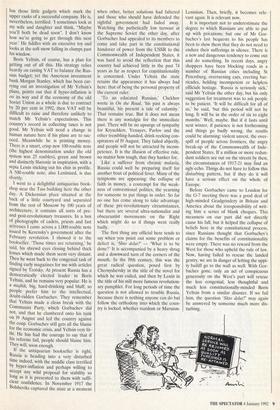WHAT IS TO BE DONE IN RUSSIA?
John Simpson fears that the death of the Soviet union only marks the beginning of the nightmare for the new order
Moscow `THE COUNTRY needs movement, har- mony, co-ordination. We have wasted so much time. We must act!' Chekhov could have used a line like that, and indeed Mikhail Gorbachev's speeches during his long resignation were often deeply Chekhovian. Now the run-down estate has finally been handed over to the Volga bailiff with vodka on his breath and a desire for revenge over some obscure act of unkindness in the distant past; while the old owners have sorrowfully moved out, still making speeches about how idle everyone has been and how the future will be better and brighter one day.
It is hard to see why Boris Yeltsin is so keen to take the place over. The other night, just before the Soviet Union evaporated and the new order commenced, I paid a visit to a big rail- way station here ( the Russian word for which is `Voksar, derived from the Victorian station at Vauxhall in London). The Kurskiy station is not one of those at which you could imagine Anna Karenina alight- ing: it was built in the 1960s in the fashion of Euston, and is extremely ugly. It is also an assem- blage of all Boris Yeltsin's most pressing problems: collapsing services, inadequate funding, poverty, crime and despair. It was midnight, and my colleague and I were there in the hope of finding a beggar woman whom we had met and filmed earli- er. She usually spent the night there with her seven children, she said. As we pushed through the heavy double doors we were hit by the foul smell of Soviet public places, composed of sweat and wet clothing and cheap cigarettes. Here, though, there were nasty additions: urine, vomit, sleeping bod- ies. If Gustave Dore had illustrated Hobbes's Leviathan, it might have looked like this. People pushed past each other in the dim light, searching, arguing, drinking. Someone made constant incomprehensible announcements on a loudhailer over and over again. All round the edges of the con- course young men were hunched over elec- tronic games, shouting as they zapped their targets.
Others slept or defecated or copulated in corners. On the stairs I stumbled across a man being loudly, liquidly sick; he turned an empty face towards me, blood running down his chin. Hundreds of people sat in utter silence, waiting in the dark for a train which would not now he leaving. They dared not leave their seats for fear some- one might take them and they would have to squat with the gypsies instead. We didn't find our beggar woman; perhaps she had been .haled away by the regulars. Instead, we were surrounded by small gypsy girls, each holding up a tiny wizened baby with the imploring gestures of saints around the Cross, each touching their mouths and whispering 'Signor, signor ...'
This is only one aspect of Boris Yeltsin's inheritance from Mikhail Gorbachev. It is not even the dominant one. Though times are hard, even at the Kurskiy Station no one seemed seriously hungry. Many elderly
People are seriously frightened. At the entrance to food stores a kind of consumerist frenzy takes over, and the once placid Russian queue erupts into a barging, shouting, dis- organised mass. A friend told me she had heard of two recent cases where elderly people had suffered fatal heart attacks in rough•"houses like this. A similar panic even overcomes people with good jobs and stable incomes, which until now have always been more than ade- quate. A young man I know runs a large department of a Moscow think-tank. He is bright, well educated, politically shrewd enough to have condemned the coup of 19 August on the third day, and he has plenty of good contacts. A few years ago he would have been a shining example of homo sovi- eticus. His suits are smart, and his office has those little gadgets which mark the upper ranks of a successful company. He is, nevertheless, terrified. 'I sometimes look at my wife and daughter and think, "Maybe you'll both be dead soon". I don't know how we're going to get through this next year.' He fiddles with an executive toy and looks at the soft snow falling in clumps past his window.
Boris Yeltsin, of course, has a plan for getting out of all this. His strategy relies heavily on raising VAT to balance the Rus- sian budget; yet the American investment bank Morgan Stanley, which has been car- tying out an investigation of Mr Yeltsin's plans, points out that if hyper-inflation is on its way and if the economy of the old Soviet Union as a whole is due to contract by 20 per cent in 1992, then VAT will be difficult to raise and therefore unlikely to match Mr Yeltsin's expectations. This country's record in collecting taxes is not good. Mr Yeltsin will need a change in human nature here if his plans are to suc- ceed. Meanwhile he is printing money. There is a smart, crisp new 100-rouble note (the highest denomination under the old system was 25 roubles), green and brown and distinctly Slavonic in inspiration, with a sepia Lenin sticking out his chin in profile. A 500-rouble note, also Leninised, is due shortly.
I went to a delightful antiquarian book- shop near the Tass building here the other day. A Dickensian place situated at the back of a little courtyard and separated from the rest of Moscow by 100 years of architecture, it contains all sorts of pre- and post-revolutionary treasures. In a box of photographs of cadets, priests and fast actresses I came across a 1,000-rouble note issued by Kerensky's government after the February revolution. I showed it to the bookseller. `Those times are returning,' he said, his shrewd eyes closing behind thick lenses which made them seem very distant. Then he went back to the congenial task of finding early magazines for me with articles signed by Trotsky. At present Russia has a democratically elected leader in Boris Yeltsin, and he remains very popular. He is
a mujhik, big, hard-drinking and bluff, so people prefer him to the intellectual,
doubt-ridden Gorbachev. They remember that Yeltsin made a clean break with the Communist Party, which Gorbachev did not, and that he clambered onto his tank on 19 August and led the country against the coup. Gorbachev still gets all the blame for the economic crisis, and Yeltsin very lit- tle. He has had the courage to say that if his reforms fail, people should blame him. They will, soon enough. If the antiquarian bookseller is right, Russia is heading into a very disturbed time indeed, with the middle class terrified by hyper-inflation and perhaps willing to accept any wild proposal for stability so long as it is presented to them with suffi- cient confidence. In November 1917 the Bolsheviks captured the state at a moment when other, better solutions had faltered and those who should have defended the rightful government had faded away. Watching the pathetically low turnout at the Supreme Soviet the other day, after Gorbachev had appealed to its members to come and take part in the constitutional handover of power from the USSR to the Commonwealth of Independent States, it was hard to avoid the reflection that this country had achieved little in the past 74 years as far as respect for constitutionality is concerned. Under Yeltsin the state retains the appearance it has always had here: that of being the personal property of the current ruler.
'To an educated Russian,' Chekhov wrote in On the Road, 'his past is always beautiful, his present a tale of calamity.' That remains true. But it does not mean there is any nostalgia for the immediate past. There will be no upsurge of sympathy for Kryuchkov, Yenayev, Pavlov and the other trembling-handed, drink-reeking con- spirators of 19 August. They failed abjectly, and people will not be attracted by incom- petence. It is the illusion of effective rule, no matter how tough, that they hanker for.
Like a sufferer from chronic malaria, Russia could well be preparing itself for another bout of political fever. Many of the symptoms are appearing: the collapse of faith in money, a contempt for the weak- ness of conventional politics, the yearning for someone to put things in order. So far no one has come along to take advantage of these pre-revolutionary circumstances, but there are several ultra-nationalist and obscurantist movements on the Right which might do so if things went really badly.
The first thing any official here tends to say when you point out some problem or defect is, `Shto delat?' — 'What is to be done?' It is accompanied by a heavy shrug and a downward turn of the corners of the
mouth. In the 19th century, this was the great radical question, posed first by Chernyshevsky in the title of the novel for which he was exiled, and then by Lenin in the title of his still more famous revolution- ary pamphlet. For long periods of time the question is not allowed to trouble Russia, because there is nothing anyone can do but follow the orthodoxy into which the coun- try is locked, whether tsardom or Marxism- Leninism. Then, briefly, it becomes rele- vant again. It is relevant now.
It is important not to underestimate the degree to which Russians are able to put up with privations: but one of Mr Gor- bachev's last bequests to his people has been to show them that they do not need to endure their sufferings in silence. There is a new and dangerous tendency to come out and do something. In recent days, angry shoppers have been blocking roads in a number of Russian cities including St Petersburg, overturning cars, erecting bar- ricades, holding incompetent or helpless officials hostage. 'Russia is seriously sick,' said Mr Yeltsin the other day, but his only suggestion for treatment was to ask people to be patient. 'It will be difficult for all of us,' he said, 'but this period will not be long. It will be in the order of six to eight months.' Well, maybe. But if it lasts until next winter, if patience is not forthcoming and things go badly wrong, the results could be alarming: violent unrest, the over- spill of people across frontiers, the angry break-up of the Commonwealth of Inde- pendent States. If a million or more redun- dant soldiers are out on the streets by then, the circumstances of 1917-21 may find an ugly echo. Things do not have to follow this disturbing pattern, but if they do it will have a serious effect on the whole of Europe.
Before Gorbachev came to London for the G-7 meeting there was a good deal of high-minded Gradgrindery in Britain and America about the irresponsibility of writ- ing him a series of blank cheques. This meanness on our part did not directly cause his fall, but it helped the collapse of beliefs here in the constitutional process, since Russians thought that Gorbachev's claims for the benefits of constitutionality were empty. There was no reward from the West for those who upheld the rule of law. Now, having failed to rescue the landed gentry, we are in danger of letting the uppi- ty bailiff go to the wall as well. With Gor- bachev gone, only an act of conspicuous generosity on the West's part will rescue the less congenial, less thoughtful and much less constitutionally-minded Boris
Yeltsin from a similar disaster. If we fail him, the question 'Sitio delat?' may again be answered by someone much more dis- turbing.











































 Previous page
Previous page